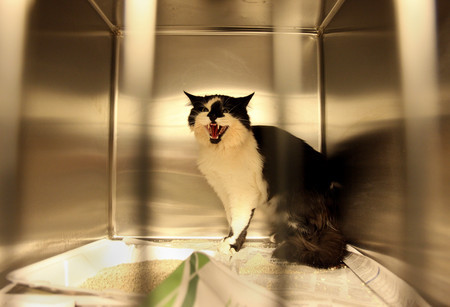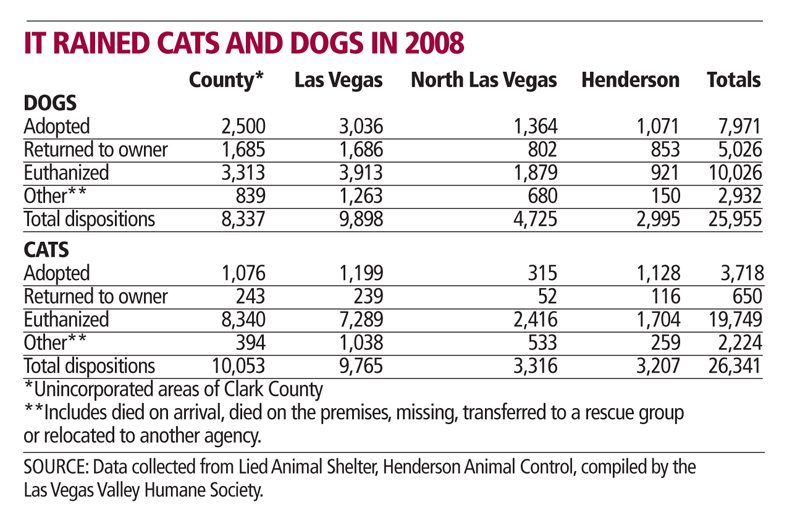Feral cats out of control
The feral cat room at the Lied Animal Shelter is a difficult place to keep clean.
That's because the cats, which at first glance look like the felines that might purr on your lap, are actually wild animals that probably could never be socialized as pets.
Their numbers are shocking, too. One estimate puts the feral cat population in Clark County at 500,000 or more.
Those that end up in the shelter are euthanized, and those statistics are also striking. Of the 30,921 animals put down in local shelters in 2008, nearly two-thirds, or 19,749, were cats.
But euthanasia is not a solution to pet overpopulation, animal officials say. That's why the city of Las Vegas is seeking to follow North Las Vegas in adopting a mandatory spay/neuter ordinance for dogs and cats as a way to break the cycle of rampant reproduction.
The measure has its critics, though, and even supporters acknowledge that the approach isn't a magic bullet.
"A mandatory spay/neuter (ordinance) is a good place to start," said Karen Coyne, head of Las Vegas' Detention and Enforcement department, which includes animal control.
If enacted, the measure might not show results for years, she said. As proposed, the ordinance would require dogs and cats over 4 months old to be spayed or neutered, with certain exceptions.
A veterinarian could certify that a pet was incapable of breeding or medically unfit for the operation.
The requirement also wouldn't apply to service animals, law enforcement and rescue animals, or those belonging to someone holding a dog or cat fancier's permit, a breeder's permit or a professional animal handler permit.
Pets impounded at the Lied shelter would have to be spayed or neutered before being returned to their owners. The animals also would have to have a microchip implanted for identification.
For enforcement purposes, the ordinance would require pet shops to submit lists of dogs and cats sold each quarter.
The proposal will be before the Las Vegas City Council soon. A council subcommittee that reviews proposed ordinances decided to send it to the council without a recommendation on whether to pass or not pass the bill after a lengthy and contentious hearing.
"There is a problem out there and we need to do something," said Councilman Stavros Anthony, although he also acknowledged that "this is a lot more complicated than I thought."
Opponents said a pet's health can be an issue. There's even a property rights angle, as a pet is someone's property.
If an unsterilized pet ends up in the shelter and is sterilized to comply with the ordinance, Anthony said, "we are actually taking somebody's property and altering it without their permission. I think that needs to be shaken out."
The main complaint from opponents is that the ordinance would require sterilization at too young an age.
"I am not against spay and neuter. It is a necessary evil," said Mike Connell of the Silver State Kennel Association. But doing it at 4 months of age is "a mutilation of a tender young body."
"It shortens their life span and causes long-term medical problems," he said. "They need that growth time."
Connell said the answer is increased educational efforts to make people realize their responsibilities as pet owners.
Ken Sondej, legislative liaison for the American Kennel Club, said sterilization at 4 months could be acceptable for shelter animals. Private citizens should have more time, he said, and officials should respect the idea of veterinarian-client privacy.
What that doesn't do, supporters say, is get at the roots of the problem, so-called "backyard breeders" and people who abandon unsterilized animals or let them run free. Those situations lead to booming animal populations that can increase exponentially.
"There is a group of people out there who are the problem, who will not spay or neuter even if you offer the service for free," said Jana Wright, who works for Clark County Commissioner Chris Giunchigliani.
The commissioner hopes to introduce a similar ordinance for Clark County by the end of the year, Wright said.
Harold Vasko, president of the Heaven Can Wait Animal Society, said the only way to bring populations under control is to get to "ground zero," spaying or neutering pets before they reproduce.
"Ten percent of the people are probably causing 70 percent of the problem," Vasko said. "We don't even say that it's wrong. People are just having litter after litter after litter."
There are other benefits of spaying and neutering besides preventing unwanted offspring. Altered pets are less likely to show aggression or roam, have reduced incidence of certain kinds of diseases and also have "reduced urine odor," according to the Oregon Veterinary Medical Association.
Coyne and Jason Smith, director of operations at the Lied shelter, said the ordinance is a way to bring recalcitrant pet owners into compliance.
Violating the ordinance would be a misdemeanor punishable by fines of $225 for a first offense, $500 for a second offense and $1,000 for the third and subsequent violations.
"This is not a solution in and of itself," Smith said. "But right now, the animal control officers' hands are tied. There's nothing to enforce."
Contact reporter Alan Choate at achoate@reviewjournal.com or 702-229-6435.



















